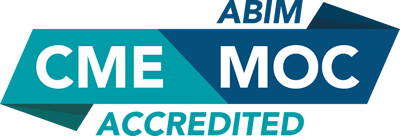
COURSE CREDITS & HOURS
14 AMA PRA Category 1 Credits™14 ACPE Credits
14.0 Contact Hours
14 (part II) MOC points in medical knowledge in the American Board of Internal Medicine's (ABIM) Maintenance of Certification (MOC) program
COURSE FEES
TARGET AUDIENCE
PROGRAM PURPOSE
- From Pharmacogenomics to Personalized Medicine
- Identify new personal health care technologies and the impact they may have on patient outcomes.
- Distinguish benefits and limitations of genetic testing and use in managing medications in specific patients.
- Evaluate various gene-drug (biomarker-drug) pairs with pharmacogenomic applications.
- Critique the various resources (e.g., CPIC, PharmGKB, FDA) for pharmacogenomics drug-gene pairs.
- Understand the difference between preemptive and reactive testing of drug-gene pairs.
- Discuss the economic cost or impact considerations related to pharmacogenomic testing.
- Understand practical approaches to counseling/patient education related to pharmacogenomics.
- Optimizing Medication Adherence and Outcomes
- Create strategies to promote medications adherence among all healthcare providers
- Describe the impact of poor adherence on clinical and economic outcomes for patient and stakeholders
- Associate the necessary points within the medication use system in which technologies can be employed to reduce medical errors and enhance patient outcomes
- Comprehensive Medication Management Services
- Outline the value of leveraging the prescription benefit to reduce downstream healthcare costs and outcomes
- Critique the rationale for collaborative models of care that deliver enhanced clinical, patient and economic outcomes that involves pharmaceutical benefits
- Recognize the importance of aligning incentives in a pay for performance model that includes all providers
- Optimizing Immunization Delivery
- Recognize a communitys healthcare needs and desires
- Communicate with patients and caregivers regarding immunizations
- Pain Management in the Age of Diversion
- Identify the opioid crisis & multi-modal pain control to enhance improved outcomes
- Analyze pain management options & treatments of complex pain
- Optimize pain care to enhance outcomes & avoid substance abuse
- Updates in Palliative Care
- Discuss the role of Palliative Care to improve team performance & quality of life
- Improve the care with Chronically ill patients
- Sepsis Prevention Strategies
- Evaluate early interventions with Surviving Sepsis Updates
- Analyze mortality & morbidity from Sepsis
- Exploring the Relationship of Depression & Dementia
- Explore anxiety related depression, dementia & treatment options with the aging population
- Associate similarities & differences in these situations
- Improving Clinician Communication Across the Continuum
- Describe techniques to decrease the communication breakdowns between & in healthcare settings & EMR systems
- Improve Patient / Clinician Communication Across the Care Continuum
- Case Studies in Biomedical Ethics
- Analyze biomedical case studies & how to apply them in real world situations
- Identify indicators & process improvement outcomes with biomedical situations
- Compassion Fatigue & Resiliency Strategies
- Identify signs of Compassion Fatigue & develop a resiliency plan































![The courtyard at in[n]Athens hotel. Guest room balconies overlook the serene space.](../images/Hotels/ht-innathens-1.webp)
![The check-in desk at in[n]Athens hotel. A staff member in a purple shirt works at a computer while he waits for the next guest to arrive.](../images/Hotels/ht-innathens-2.webp)
![Room service being delivered to a guest room at in[n]Athens hotel. A staff member in a beige shirt carries an open faced sandwich with prosciutto, lettuce, tomato, and a balsamic vinaigrette drizzle.](../images/Hotels/ht-innathens-3.webp)
![A common seating area at in[n]Athens hotel. Stools surround several tables, with bookshelves covered in trinkets built into the walls.](../images/Hotels/ht-innathens-4.webp)
![A lemon tree growing at the center of the courtyard at in[n]Athens hotel.](../images/Hotels/ht-innathens-5.webp)
![The view of the front of in[n]Athens hotel from across the street.](../images/Hotels/ht-innathens-6.webp)
![A guest room at in[n]Athens hotel featuring a large bed, a sofa, and a sliding door leading to the bathroom.](../images/Hotels/ht-innathens-7.webp)
![A guest room at in[n]Athens hotel featuring two twin beds and a window with a view of a historic church.](../images/Hotels/ht-innathens-8.webp)
![A guest bathroom at in[n]Athens hotel sporting a modern design and a small succulent plant.](../images/Hotels/ht-innathens-9.webp)



























